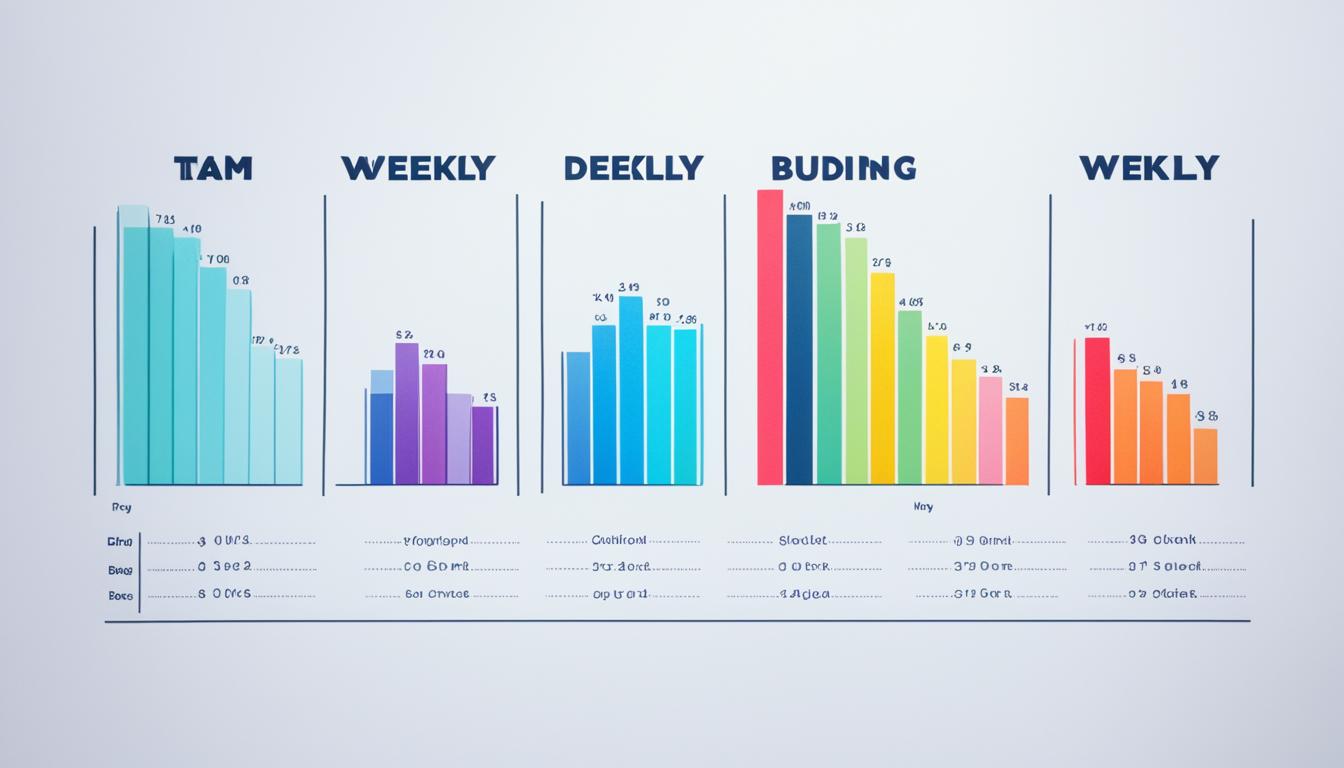Setting goals for personal and professional growth can feel hard without a plan. Using the SMART goals method can make you more productive and help you focus. The SMART method means Specific, Measurable, Attainable, Relevant, and Time-bound. It was first used by George T. Doran in 1981 and has helped many people reach their goals.
Setting weekly goals is not just for reaching big dreams. It’s also a way to keep getting better every week. By achieving small goals, you build up your motivation and strength. This helps you avoid getting stuck in your progress.
In this article, we’ll look at ten weekly goals that follow the SMART method. These goals will help you stay focused and make more progress overall.

Key Takeaways
- The SMART goal-setting method was created by George T. Doran in 1981.
- SMART stands for Specific, Measurable, Attainable, Relevant, and Time-bound.
- Apply SMART criteria to structure weekly goals effectively.
- Weekly goals can improve both personal development and professional growth.
- Incremental progress fosters motivation and resilience.
Introduction to Weekly Goals
Creating weekly goals helps turn dreams into real progress. It’s not just a list of wishes. It’s about setting goals with a strong action plan that aligns with broader objectives. This plan helps with personal, business, and professional goals. With 168 hours a week, setting weekly objectives is key. Taking time before the upcoming week to define these objectives can foster personal and professional growth.
Setting weekly objectives is vital for reaching big goals. Short goals boost focus, cut down on delay, build confidence, and manage time well. They give a clear way to reach long-term goals.
Putting goals in a calendar makes you more accountable and motivated. Daily reminders for weekly goals help keep you focused and committed. It’s important to sort tasks by urgency and importance to avoid too much work and manage tasks better.
Goals should be clear, achievable, and measurable for the week. Celebrating small wins is key for staying motivated. Regularly tracking progress and making action plans for weekly goals boosts well-being, confidence, and a sense of achievement.
Key BenefitsDetailsEnhanced FocusWeekly goals help improve focus by breaking tasks into manageable pieces. Reduced StressStructured task management reduces stress and prevents feeling overwhelmed. Improved Well-beingSetting and achieving goals can lead to better health and increased self-confidence. Clear Path Weekly objectives provide a clear trajectory towards long-term goals.
Understanding SMART Goals for Weekly Success
Setting goals is key for growth in life and work. SMART goals help by giving a clear plan to reach goals.
What are SMART Goals?
SMART means Specific, Measurable, Achievable, Realistic, and Timely. George T. Doran created this in 1981 to make goal-setting clear and precise. SMART goals make sure goals are clear and can be done.

The Importance of Setting SMART Goals
SMART goals help with planning well. Specific and measurable goals give a clear aim and way to measure success. Goals should be achievable and realistic to keep you motivated and not overwhelmed. Deadlines make goals urgent and help you focus.
Applying SMART Criteria to Weekly Goals
Weekly goals make SMART planning easy for everyday life. They turn big goals into smaller tasks for the week.
- Specific: Clearly define what you aim to achieve within the week.
- Measurable: Establish metrics or milestones to track progress.
- Achievable: Set goals that are realistic given your resources and time constraints.
- Realistic: Align your goals with your capabilities and other commitments.
- Timely: Define a clear timeframe to complete the goal.
Using SMART helps boost your productivity and track progress. Tools like ClickUp make tracking goals easy. Reviewing past weeks and months helps set better goals.
Writing down your goals and using SMART increases your chance of success. Studies show written goals are 44% more likely to be met. Using these ideas in your weekly goals helps with short-term and long-term growth.
Planning Your Week: Prioritizing Tasks
Start your week by picking the most important tasks. This helps you focus on what really matters. By sorting tasks, you can work better and meet your goals.

Identifying High-Priority Tasks
It’s key to know which tasks are most important. Tools like the Eisenhower Matrix and Pomodoro Technique help. They show which tasks need your attention now and which can wait.
- Eisenhower Matrix: This method sorts tasks into four groups: urgent and important, not urgent but important, urgent but not important, and not urgent or important.
- Pomodoro Technique: This method involves working on important tasks in short periods. It helps avoid burnout and keeps you productive.
Studies show 7 out of 10 people use tools like the Eisenhower matrix to focus on what’s most important.
Creating a Task Hierarchy
Organizing tasks helps you know what to do first. This way, you tackle the most critical tasks right away, aligning them with your monthly goals. It makes managing your time better.
- Weekly Planner: Use this to keep an eye on your tasks and goals for the week.
- Monthly Planner: This helps you plan for the month, fitting in with your weekly plans.
- Daily Planner: Improve how you manage tasks each day and keep track of what’s important.
- Focus Planner: This tool helps you focus on tasks that really matter, making sure important work gets done.
Research shows 6 out of 10 people plan their tasks with tools like weekly planners, Gantt charts, or Kanban boards. This shows how important planning is for getting tasks done and being productive.
Goal Setting for Personal Development
Personal development means growing and getting better every day, which is essential for personal growth. Setting weekly goals helps you work on new skills, keep a balanced life, and keep learning. This makes you better in many areas. Reflecting on your overarching life goals can help create actionable steps, ensuring that achieving smaller, short-term goals maintains progress toward these larger aspirations.
Fostering New Skills
Learning new skills is key for growing personally and professionally. Reading every day can make you smarter and more knowledgeable. Trying to give 10% more effort in your work can also make a big difference.
By learning new skills, you improve yourself. This helps you grow in many ways.

Maintaining a Healthier Work-Life Balance
Having a balanced life is important for feeling good and promoting a healthier work life balance. It means taking care of yourself by sleeping well, eating right, and exercising. Keeping your space clean and organized helps your mind and work too. Maintaining a healthy balance between work and personal life is essential for overall well-being.
Setting goals for a balanced life makes you happier and healthier.
Importance of Continuous Learning
Always learning is a big part of growing. It helps you understand people better, make more friends, and improve your relationships. Being mindful and thankful also clears your mind and makes you more productive.
Setting goals for learning keeps you moving forward and getting better.
AspectImprovement StrategyBenefitsSkill DevelopmentDaily reading, giving extra effort in tasksSignificant growth, enhanced learningWork-Life BalanceSelf-care (sleep, nutrition, exercise), tidy spaceImproved mental well-being, productivityContinuous LearningEnhancing emotional intelligence, networkingBetter interactions, more opportunities
Goal Setting for Professional Growth
Setting goals is key for moving up in your career and hitting big professional targets. Having clear goals helps you focus on what you want to achieve. This means setting goals that are specific, measurable, attainable, relevant, and time-bound (SMART).

- Percentage increase as a development goal: ”Increase sales or revenue by a certain percentage.”
- Team engagement goal: ”Build a professional rapport with the members of your team.”
- Company revenue goal: ”Increase revenue from recurring customers by 15% for the financial year.”
- Feedback gathering goal: ”Gain upward feedback before the end of the quarter to establish what can be improved.”
- Skill improvement goal: ”Improve presentation skills by enlisting help, to make things more engaging for the team.”
- Learning goal: ”Learn how to give and receive effective feedback from team members.”
- Remote team management goal: ”Improve the ability to manage the team remotely.”
- Training goal: ”Complete a leadership training course before the end of the quarter.”
- Industry understanding goal: ”Gain a more in-depth perspective of how departments within the company are run.”
- Performance review evaluation goal: ”Do an audit of your performance reviews and assess feedback.”
Setting these goals helps you grow in your career. You can also boost your skills by getting a new certification or going to professional development programs. Adding these steps to your plan can help you hit big career goals.
Mental and Physical Health Goals
Both mental clarity and physical vitality are key to feeling good and doing well. They can be improved with weekly goals. Activities like regular exercise, taking care of your mind, and sleeping well are important. Doing these things each week can make you feel better in mind and body.
Incorporating Physical Activity
Being active is key for staying fit and feeling less anxious or depressed. Studies show even short exercises, like 10 to 15 minutes, help. Adults should aim for 30 minutes of activity daily. Kids need an hour or more, and little ones should move all day.

Having a weekly plan for exercise can boost your fitness. Here are some steps to follow:
- Schedule walks or jogs every day.
- Add strength training or yoga to your routine.
- Try group classes or team sports.
Importance of Mental Well-being
Keeping your mind healthy is vital for your overall health. Experts say it’s important to have a routine, manage stress, and take care of yourself. Doing mindfulness, like meditation, can clear your mind and lower stress. It’s also key to get help when you need it for your mental health.
Here are ways to help your mental health:
- Do mindfulness or meditation every day.
- Find ways to reduce stress.
- Keep strong relationships with loved ones.
Consistent Sleep Patterns
Sticking to a sleep schedule is crucial for your health. The National Sleep Foundation says adults need 7 to 9 hours of sleep. Kids need 9 to 11 hours, and teens 8 to 10. A regular sleep schedule and a calming bedtime routine can make you healthier.
Here are tips for better sleep:
- Keep a regular sleep schedule, even on weekends.
- Have a bedtime routine, like reading or a warm bath.
- Make your bedroom sleep-friendly: dark, quiet, and cool.
Establishing Effective Time Management
Managing time well is key to reaching your weekly goals. Using practical strategies and tools can really help. Set aside specific times for each task to improve how you work and cut down on waste.
Using Time Management Tools
Choosing the right productivity tools can boost your time management. Digital calendars, task apps, and planners help with planning and doing tasks well. For example, EmpMonitor tracks your activities, analyzes productivity, and offers detailed controls to make you more efficient.
ToolFeaturesBenefitsEmpMonitorReal-time activity tracking, detailed reports, productivity analysisEnhances time management, optimizes productivityForestFocus timer, virtual coins for tree plantingPromotes focus, environmentally friendlyStayFocusedBlock distracting websitesReduce time-wasters, increase focusFreedomBlocks websites and apps on all devicesImproves concentration, free trial available
Allocating Time for Each Task
Effective task allocation means setting aside specific times for each job. The Pomodoro method, with its 25-minute work and short breaks, keeps you focused and efficient. Keeping a time log helps spot when you’re most productive and where you waste time.
Sorting tasks by urgency and importance, like with the Eisenhower Matrix, also boosts productivity. This way, you focus on urgent and important tasks first. It makes managing tasks and staying efficient easier.
Building Momentum with Weekly Goals: A Weekly Review
Setting weekly goals is key to getting better and making steady progress. A small 1% daily improvement can grow to a 37-fold increase in a year, as James Clear explains in “Atomic Habits.”
Knowing how important momentum planning is crucial. Breaking big goals into 13-week chunks helps focus on smaller, easier targets. This way, setting weekly goals boosts progress and keeps you improving and moving forward. Incorporating a weekly focus helps in prioritizing daily activities and fosters a habit of goal-setting by encouraging reflection on larger aspirations in manageable timeframes.
Small changes repeated often lead to big results, similar to Dave Ramsey’s debt snowball method but for all areas of life. Daily actions help build a sense of achievement and keep you aiming for your weekly goals.
“For lasting success, small, incremental changes, when repeated, create powerful compounding effects, ultimately leading to monumental progress.” — Leslie Beale, ACC, JD
Using S.M.A.R.T. goals makes a big difference in momentum. Goals should be specific, measurable, attainable, relevant, and time-bound. This makes sure your weekly goals are clear and reachable. It’s a great way to set small goals that help you reach big dreams.
Only 9% of people write down their weekly goals, and only 3% hit them. This shows how important it is to keep track of your progress and check in weekly. Keeping track helps you stay focused and keep improving.
It’s important to celebrate your wins, even if they’re small. Celebrating helps keep you moving and makes you more committed to your goals. This cycle of setting, achieving, and celebrating keeps you making progress and getting rewards.
Even when things don’t go as planned, it’s key to keep going. Personal and professional growth depends a lot on momentum. Seeing setbacks as chances to improve and adjust your plans is crucial. Adding new habits to your daily routine can also help you make more progress and achieve more.
Goal-Setting StrategiesKey BenefitsSegmenting goals into 13-week periodsEnhanced focus and manageable targetsDedicating daily actionsSteady momentum buildingAdapting S.M.A.R.T. goalsClear and attainable objectivesWeekly evaluationsContinuous improvement and progress tracking
The power of building momentum with weekly goals is huge. Small steps and steady effort lead to big achievements over time. Using these methods will help you keep improving and moving forward.
Creating Weekly Goals for Team Collaboration
Creating weekly goals is key to good teamwork. These goals help the team work together better. They give everyone a clear direction and show each person their part in the team. A weekly review can help track progress and ensure accountability.
Working towards common goals makes the team more productive and united. It’s all about teamwork.
Setting Collective Goals
It’s important to set goals for the team to work together well. These goals can be about sales, working together, or finishing projects. For example, a goal might be to increase sales by 15% in three months.
Each team member has their own sales targets. This way, everyone knows what they need to do. It makes sure all parts of the project are covered, from sales to communication and new ideas.
- Performance Goals: Enhance team productivity and quality.
- Collaborative Goals: Foster innovation and problem-solving skills.
- Project-specific Goals: Achieve specific project outcomes and milestones.
These goals help track progress and show how everyone’s work helps the team. Regularly checking and changing goals keeps the team motivated.
Encouraging Team Accountability
Team accountability makes sure everyone does their part. It helps the team meet its weekly goals. You can encourage accountability with weekly meetings, using tools like Hive’s Goals feature, and celebrating small wins.
When team members keep each other on track, everyone feels more responsible. This pushes the whole team towards their goals.
ObjectiveBenefitReach Project MilestonesMaintains direction and purposeEnhance CommunicationImproves collaboration and productivityFoster InnovationEncourages creative problem-solvingIncrease QualityEnsures high standards and consistency
Being accountable and having clear goals is key for trust and teamwork. Setting realistic weekly goals keeps the team motivated and engaged in their work.
Leveraging Accountability Partners
An accountability partner can give you a big boost in reaching your weekly goals. This partnership needs to be built on trust and regular meetings. It’s important to pick someone who makes you want to work harder and stay on track.
Finding the Right Accountability Partner
Picking the right person to be your accountability partner is key. Studies show that 80% of people with a partner achieve their goals. And 90% of students do better when they meet with a partner regularly.
Look for someone who is dependable and can give you good advice. This kind of partnership helps both of you move forward together. Make sure you both have clear goals and tasks to work on.
Regular Check-ins and Assessments
Meeting regularly with your partner is vital for keeping up the good work and checking on your progress. Research shows that weekly or biweekly meetings can help you make more progress. And 85% of people find these meetings helpful.
Using scoreboards to track your progress can make you 40% more likely to reach your goals. An online system with easy-to-use features like deadlines and reminders can make tracking easier. This helps you stay on top of things and turn your efforts into real results.
FAQ
What are SMART Goals?
SMART Goals make vague goals clear and achievable. They use Specific, Measurable, Attainable, Relevant, and Time-bound criteria. This makes sure each goal is clear and can be reached.
The Importance of Setting SMART Goals
SMART Goals are key for success. They set clear targets with specific measures for success. They also make sure goals are realistic and have deadlines. This helps in focusing efforts and staying motivated.
Applying SMART Criteria to Weekly Goals
For weekly goals, use SMART criteria to set clear targets. This method helps in taking focused actions. It also helps overcome challenges that might stop success.
Identifying High-Priority Tasks
To find important tasks, look at both personal and work duties. Make a list that puts the most critical tasks first. This helps use time and resources well, making you more productive.
Creating a Task Hierarchy
Make a task list by sorting tasks by their importance and urgency. This way, important tasks get done first. It helps you stay productive and move closer to your weekly goals.
Fostering New Skills
To learn new skills, set clear goals and spend time each week on learning. This commitment is key for getting better at new things and improving yourself.
Maintaining Work-Life Balance
For a good work-life balance, set goals that balance work and personal life. This approach to goal-setting helps lead a fulfilling life.
Importance of Continuous Learning
Learning new things is important for growing personally and professionally. Setting weekly goals for learning new skills helps keep improving yourself and embracing lifelong learning.
Incorporating Physical Activity
Add physical activity to your weekly goals by setting exercise targets. Being fit is key for your health. It boosts your mental and physical health.
Importance of Mental Well-being
Good mental health is key for success. Weekly goals for mental health can include mindfulness, stress management, and checking in on your mental health.
Consistent Sleep Patterns
Good sleep habits are important for your health. Set weekly goals for enough and regular sleep. This can make you more productive and healthy.
Using Time Management Tools
Tools like digital calendars and apps can make you more efficient. They help plan and follow your weekly goals well, making sure each task gets the focus it needs.
Allocating Time for Each Task
Plan specific time for each task to make sure everything gets done well. This method cuts down on wasted time and helps manage tasks better.
Setting Collective Goals
Setting goals together with a team makes everyone work towards the same goal. Shared goals create a sense of responsibility and help achieve weekly goals through teamwork.
Encouraging Team Accountability
Team accountability makes sure everyone is committed to their role. This boosts the team’s success. Regular meetings and support are important for accountability.
Finding the Right Accountability Partner
Choose an accountability partner who inspires you to work hard. This partnership should be based on trust and regular support to help reach your goals.
Regular Check-ins and Assessments
Checking in regularly with your accountability partner is key for tracking progress. This keeps goals on track and adjusts them as needed to keep moving forward.

More Posts
Top 9 Best Goal Planner App for Personal Development
In today’s fast-paced world, personal development has become an essential aspect of achieving success and fulfillment. As individuals strive to maximize their potential and improve their lives, having a goal planner app designed...
30 Best Morning Habits & Routines You Should Adopt
What you cultivate in the morning influences how you feel, act, and think during the rest of your day. Studies have shown that it takes you exactly twenty one days to form a...
50 Most Popular Stephen Covey Quotes of All Times
Stephen R. Covey’s book, The 7 Habits of Highly Effective People®, widely recognized as his most influential work on personal and organizational effectiveness, continues to be a best seller for the simple reason...
Effective time management for college students